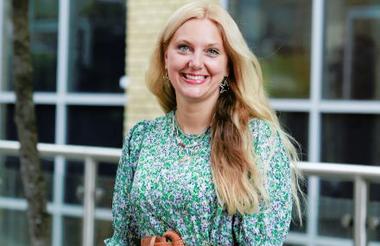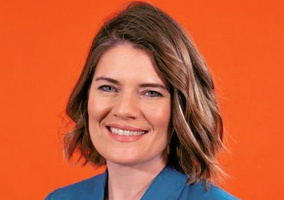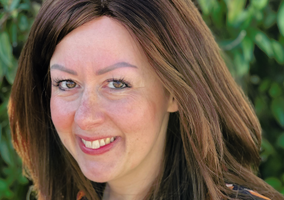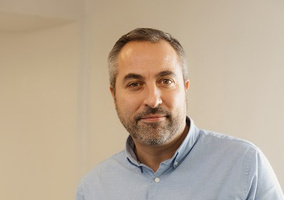Although not perhaps the most typical trajectory for an orchestral trumpet player, it was while studying music that Gemma Sherrington first considered a career in the charity sector.
While at university, her first exposure to the sector was as a volunteer in charity shops; she later extended her involvement to become a fundraiser for the Sheffield Royal Society for the Blind.
“I had this real connection to creating social impact. I could see the systemic injustice at lots of different causes,” she says. “And because I was volunteering in lots of different things, I was seeing it across a lot of different issues.”
Making change is ‘kind of addictive’
Upon finishing her studies and having been inspired by her volunteering work, Sherrington decided to instead look at working for a charity.
After successfully applying for a graduate scheme at the NSPCC, she began what would become a nearly 23-year-long career as a fundraiser in 2003.
“It was that feeling that you are able to make change, and also being around other people who are trying to make change in the world and make positive change,” Sherrington says, of her early career. “It’s kind of addictive.”
Following other fundraising roles at Cardinal Hume Centre and WaterAid, it would be at Save the Children UK where Sherrington would spend the majority of her professional life so far.
Across 18 years at the international development organisation, Sherrington ascended the ranks from being a new community ventures manager to becoming interim CEO in early 2024.
Refuge ‘felt like the right fit’
Throughout her time at Save the Children, Sherrington says she was particularly engaged with its initiatives combatting domestic violence against women and girls, leading to her eventual move to Refuge in March this year.
“Refuge, as an organisation, had long been somewhere that I’d admired around its ability to deliver both really good quality service but also leverage that knowledge to create change – big, systemic, policy change – beyond its size, really,” she says.
“When I was finishing up on the interim CEO role and looking for a permanent leadership role in an organisation, this felt very much like the right fit for me.
“I think those things, combined with it being a time where Refuge was going into a period of needing sustained leadership, a new ambition and vision for the organisation, meant it just felt like the right one at the right time.
“I was absolutely delighted when I got it. I felt very lucky.”
Creating a ‘safer, more inclusive culture’
Sherrington has arrived at the UK’s largest domestic violence charity two years after some staff members raised allegations of bullying and a “toxic” workplace culture.
The charity’s previous permanent CEO Ruth Davison had taken over from Sandra Horley, who led the charity for more than 30 years and faced similar reports in 2018 of a “toxic” working environment from former employees.
Since Davison’s departure in 2023, Refuge has had two interim CEOs, Ellen Miller and most recently Abigail Ampofo, who joined in February last year.
Sherrington says she has “huge respect” for her predecessors, and aims to build on Davison, Miller and Ampofo’s work to change the culture at the charity.
“This has been about transitioning the organisation from a founder-led organisation into a progressive, professionalised organisation, and that transition is always bumpy,” she says.
“I have huge respect for people that have navigated the organisation to this point, and it’s now in a place where it can be sustainable.
“I’ve only been in a month but I can see there’s been a lot of work over the last four years in particular on creating a safer, more inclusive culture here. We have to be the best in order to create the best experience for survivors.”
Sherrington says instigating ongoing workplace cultural change will be “one of my focus areas as CEO”.
In terms of her own leadership style, Sherrington prefers to avoid “a hierarchical style of organisation” and instead aims to create “really high autonomy and high accountability in the organisation”, and to bring more power to staff beyond the senior leadership team.
“People talk a lot about being servant leaders or empowerment leaders, which is a bit intangible,” she says.
“I like to create a working environment where that autonomy and decision-making sits really close to the expertise, and there is high accountability there as well.”
Sustainable funding
After spending the best part of her first month at the charity doing site visits to different Refuge shelters around the country, Sherrington has seen first hand the financial challenges facing her sector.
While hearing from survivors, she became preoccupied with how to improve the services the charity offers further as well as the overall system for those experiencing and reporting domestic abuse.
“Be it what’s happening in a courtroom, or a police station, or even in other settings like schools – how do we make that system work better for survivors so that they are believed or supported?” Sherrington says.
“It requires sustainable funding, rather than crisis funding, which is hard.
“How do we knit the system together better for survivors? Be it what’s happening in a courtroom or a police station, even in other settings like schools—how do we make that system work better for survivors so that they are believed and supported?”
Nevertheless, Sherrington remains optimistic.
“We can make specific policy changes and we can make sustainable investments in things,” she says. “We don’t have to do it all at once. There are tangible things we can do.
“And to do that and get it to work as a whole sector, actually, we’ve got to listen more to the experiences of survivors, because when we do it’s really clear that things are not working.”
Senior leadership cannot be ‘at the detriment of my home life’
In her first permanent CEO role, Sherrington has sought to cultivate a strong work-life balance because she knows that “I’ll be at my best for the organisation if I’m really on top of that stuff”.
At an organisation like Refuge, where the emotional toll may be especially heavy considering the nature of much of work that Sherrington and her colleagues do, this balance has remained of utmost importance for her to avoid burnout.
Sherrington and her partner are parents to two boys, and have a dog and a cat. “I want that to be the big focus in my life,” she says.
“I didn’t want to move into senior leadership at all, actually, if it meant that it was to be at the detriment of my home life and my wellbeing.
“I think very early on, when I moved into leadership, I thought about the boundaries I would put in place for myself. That might be around how I work. It might be about the flexibility of how I work – I don’t work evenings and weekends because I’m with my children.”
She also discusses being “very proactive” on her personal wellbeing, creating and maintaining healthy habits like exercising daily and eating well.
“That sort of thing has really helped me feel resilient through the leadership roles and actually not get to the space where I felt burnt out.
“It’s recognising the signs when you feel pressure building and knowing that you might need to take time out. I’ve learned to be really proactive on that and a bit unapologetically proactive.”
Looking to the future
As she looks ahead to her first year as CEO at Refuge, Sherrington has several key goals in mind.
Sherrington wants to help create a culture of “amazing impact” at the organisation, where people feel “really safe and included, so they do absolutely their best work”.
She also hopes to continue creating more quality and inclusive services for domestic abuse survivors and to increase Refuge’s collaboration with the government, and minister Jess Phillips in particular, on its domestic violence against women and girls prevention strategy.
Within this opportunity, Sherrington sees the possibility to create the systemic change that drew her to the sector in the first place.
She also wants to collaborate more with other domestic violence support charities and local service providers, because, as she notes, “no one organisation is going to solve their mission alone”.
Sherrington also emphasises her hopes to place an even larger focus on placing survivors’ voices at the heart of Refuge.
“That needs to be in our day to day, how we’re listening and responding to survivors,” she says, “to be a really adaptable organisation, to change what we’re offering naturally in terms of support, so we don’t get fixed in the wrong lanes.”
Related articles












